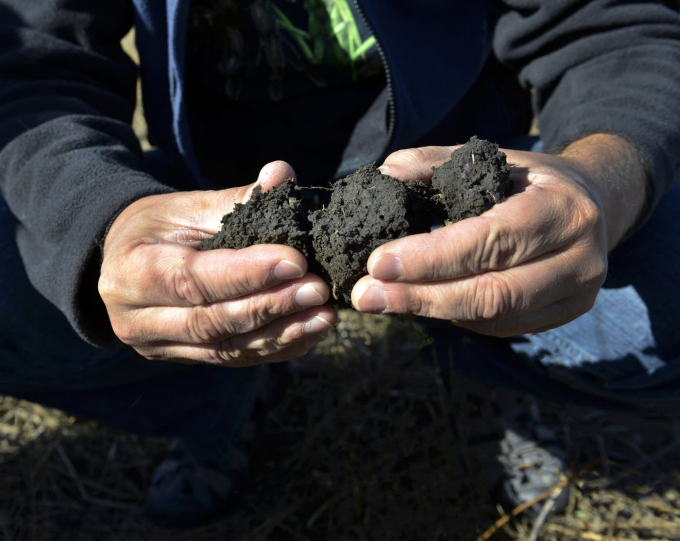November 27, 2025 | 18:54 GMT +7
November 27, 2025 | 18:54 GMT +7
Hotline: 0913.378.918
November 27, 2025 | 18:54 GMT +7
Hotline: 0913.378.918

Jonathan Lundgren, director and CEO of Blue Dasher Farm, a research and demonstration farm in regenerative agriculture, holds a sample of soil on his farm near Estelline, S.D., to show the positive effects of regenerative agriculture.
Dan Koeck for MPR News
“We did one Facebook post on it, and so far, we've gotten 350 farmers,” he said. “The interest is there. This movement is very real right now, and the farmers are demonstrating that by their interest in gathering primary data on their farming operations.”
The South Dakota-based nonprofit research organization has been studying regenerative agriculture for several years and finding that regenerative principles increase biodiversity and profits.
Scaling up that research to 1,000 farms across the country is a big challenge, but Lundgren said a large database is needed to answer questions about whether the systemic, sustainable changes in farming work and can be profitable if implemented broadly.
"The status quo in science and in farming isn't getting us where we need to go,” he said. “We need bold action, and the farmers are doing their part. They're changing. Now it's time for the science to catch up.”
Researchers will look at farms with varying levels of adoption of regenerative principles.
Regenerative practices include planting cover crops, growing a more diverse mix of crops, grazing livestock on harvested fields and reducing pesticide use.
Researchers have divided the country into 10 eco-regions and will gather large amounts of data from farms in each region.
“We'll be looking at soils and carbon down to a meter deep. We'll be looking at micronutrient status of the soil. We'll be looking at soil microbiology, water quality and dynamics within the water profile,” said Lundgren. “We'll be looking at insects and plants and birds and the nutrition of the food, and we'll also be looking at the economics of the operation.”
To manage the data, Lundgren said the research team has devised new tools, including the use of artificial intelligence to identify thousands of insects collected in fields.
Farmers will collect some of the raw data, and researchers will use automated data collection sensors in addition to on-farm visits.
Lundgren estimates it will cost about $7,500 for each field studied, and the full cost of the ten-year project is expected to reach $80 million.
A variety of partners have signed on including General Mills, Ducks Unlimited, the U.S. Geological Survey and several philanthropic organizations. Lundgren said farmers and farm organizations are also donating to the project.
Lundgren expects to start the research next month, with the goal of having 1,000 farms enrolled by next year. There are two overarching goals for the research.
"Number one will be testing whether regenerative agriculture works no matter what you grow and where you grow it,” said Lundgren. “And then we also will be providing road maps that farmers develop for successful transitioning to regenerative systems."
(mprnews)

(VAN) A new study reveals how the simultaneous effects of ocean acidification, salinity and loss of oxygen are making the world more fragile.

(VAN) Hopes are growing that the creation of the first 3D turkey gut model could be a turning point in the battle against the virulent blackhead disease.

(VAN) Tyson, America’s biggest meat supplier, plans to shutter one of its largest beef processing plants as the industry continues to struggle with low cattle supplies and political pressure from Washington.

(VAN) New FAO study shows how digital solutions are empowering farmers and fishers to prevent losses and build resilient agrifood systems.

(VAN) Brazil's COP30 presidency pushed through a compromise climate deal on Saturday that would boost finance for poor nations coping with global warming but that omitted any mention of the fossil fuels driving it.

(VAN) Poultry farmers in the UK have been warned that they could face one of the worst winters yet for bird flu.

(VAN) Prices of main-crop paddy have risen sharply, with jasmine rice hitting 16,100 baht per tonne — the highest level in years.